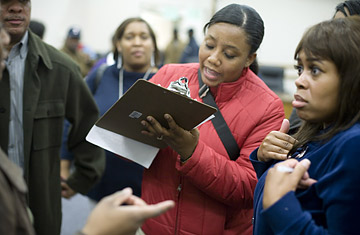
Voters sign a delegate sign up sheet during a caucus, March 4, 2008 in DeSoto, Texas.
You can hear the big floor announcement in Denver now — just as the roll call vote for the Democratic nomination reaches its climax, the podium recognizes chairman of the huge, 228-seat Texas delegation.
And then it happens:
"Madame Chairwoman — The Lone Star State of Texas, home of the Longhorns and the Aggies, birthplace of Buddy Holly and the Dixie Chicks, where the Brazos River rises and then touches the sea...proudly casts its 228 votes for...um, hang on, a minute, Madame Chairwoman, we're still counting..."
That's right, despite what you may have heard, it's going to be weeks, and probably months, before we know who actually won the complex March 4 Texas primary-cum-caucus. And even then both campaigns are liable to still be disputing the results when they get to Denver in August.
We do know this much about Texas: Clinton and Obama virtually split the state's 126 pledged delegates. Clinton won 65 delegates to Obama's 61, all allocated according to the results of the primary, which Clinton won 51% to 47.4%.
But as many Americans have learned over the last few months, caucuses aren't so easy to calculate — and they seem designed for never-ending fights even after the math is done. There were some 8,247 local gatherings around Texas last week, and precinct chairs are supposed to report their results to 254 county chairs quickly (except, this being Democratic politics in Texas, big city precincts report in a different fashion — but never mind them for now.) Based on the precinct results, county conventions are supposed to elect delegates to a state convention — and it is at that state convention on June 6 that everyone votes again to decide who goes to Denver pledged to Clinton or Obama. This three-step process will determine how the 67 caucus delegates in Denver are divided.
That kind of clarity is still a long way off. Because of an overwhelming turnout on caucus night, Texas Democrats are still counting the ballots, cards, and even the loose slips of paper that precinct captains handed out and then collected on the night of March 4, when roughly one million people turned out. Some precincts were so overwhelmed with attendees that some precinct chairs went to Kinko's to run off extra ballots while others, according to the AP, simply tore down the "DEMOCRATS VOTE HERE" signs and used the backs for signatures — one column for Clinton, another for Obama. About 300 people showed up at one caucus site in Austin only to discover the small building arranged for the meeting (and which might have accomodated 50 people) was locked. So they caucused outside in the chilly night using a flashlight, loaned by a photographer, to see the caucus ballots. Needless to say, some of those results are likely to be disputed.
It's anyone's guess who will come out on top in that first-stage count, but Obama appears to have an edge. For much of the last week, the state party was posting "unofficial" returns on its website — txdemocrats.org — chiefly for reporters. With 41% of the precincts reporting, Obama was leading Clinton by a margin of 56% to 44%.
Why so lopsided? It may be that the enthusiasm in the Obama campaign in Texas, as it has done in most other state caucuses this year, trumped that of Clinton's ground forces. There is the possibility that the stalled count includes areas more favorable to Obama while Clinton's strongholds are yet to be counted. Then there are suggestions that Republicans, hoping to prolong the Clinton-Obama slugfest, voted in the Democratic contest. (Since some 700,000 Democratic primary voters did not bother to vote in other races down ballot, particularly in strong Republican counties, it is likely those voters did not turn up for the more prolonged caucus proceeding either.)
In any case, the last unofficial margin — if it held — would give Obama 31 delegates and Clinton 27, with nine still to be determined.
Then there are the 35 Texas superdelegates. At last count, Clinton had 11, Obama had nine, 12 were undecided and another three are to be named later. All those numbers offer numerous possible outcomes; but nearly all of them are likely to make the delegate count tighter than a pair of Wranglers on an urban cowboy.
But it will be weeks before we know those exact numbers. The slow pace of the counting (and some other reasons too complex to mention here) led the state party to halt its progressive count and simply hold off announcing the precinct results until March 29. But both campaigns now realize that they must ride herd on their delegates each step of the way to be sure their anointed delegates remain loyal to the candidate. As with most caucuses, they are allowed to switch their candidates even after the actual caucuses are finished, at least until the county convention; in Colorado, there have already been reports of some delegates already having shifted their allegiances from Obama to Clinton.
Meanwhile, at the county level, party officials are grappling with complaints. In Galveston County, for example, Democratic leaders announced they will appoint a local "credentials committee" next week to oversee another committee that is counting the votes amid multiple charges of irregularities. They include not checking signatures against voter rolls; taking sign-in sheets to campaign offices and failing to turn in the paperwork on time.
In politics, the most important things almost always go down to the wire. And sometimes past it. Texas, it now appears, will be no exception to that rule. As Jesse Jackson once said as he made his own way to the Atlanta convention in 1988, clinging to nearly 1,000 delegates and stubbornly refusing to give up the fight, "It ain't over till its over. And even then it ain't over."
